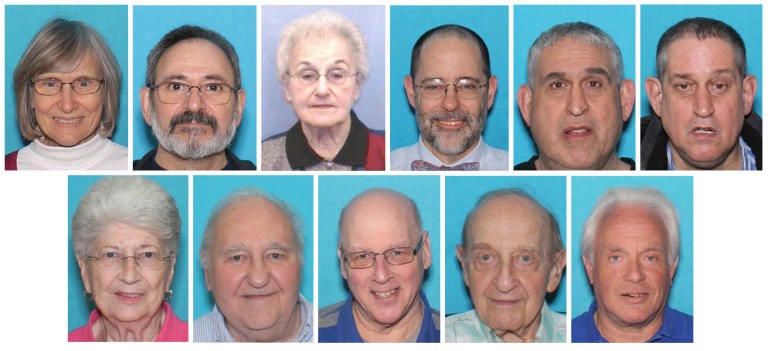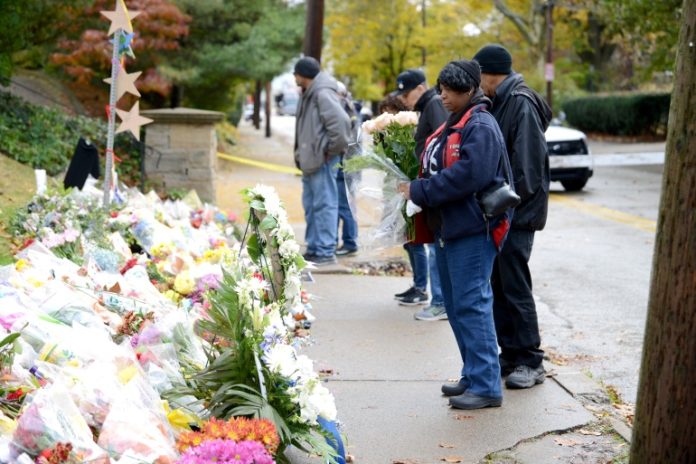Lawyers for the shooter, who was convicted of the deadliest anti-Semitic attack in United States history, have been trying to persuade the jury to spare his life as the penalty phase of his federal trial begins.
Robert Bowers has suffered from psychotic illness and severe brain damage since childhood and has attempted suicide in the past, defense attorney Michael Burt said Monday.
Burt also said that Bowers had a history of suffering from psychotic, delusional and paranoid symptoms that left him unable to understand the world and make appropriate decisions.
Bowers was convicted this month of the 2018 killing of 11 worshipers at the Tree of Life Synagogue in Pittsburgh, Pennsylvania. Prosecutors want the death penalty.
The defense argued that Bowers was unable to generate the necessary will to allow the jury to hand down a death sentence. Medical tests found Bower’s brain to have “structural deficits” with symptoms consistent with epilepsy and schizophrenia, Burt said.
Meanwhile, in his opening remarks on Monday, prosecutor Troy Rivetti said the government stands ready to overturn any mental health objections.
Bowers clearly intended to kill anyone he could find at the Tree of Life Synagogue on October 27, 2018, Rivetti said. He called the scale of Bowers’ crimes staggering.
“He came to kill,” said Rivetti. “The defendant entered the Tree of Life Synagogue, a sacred place for gathering and prayer, and murdered eleven innocent believers.”
Bowers, flipping through the filing, gave little indication that he was listening to the attorneys’ statements. During the entire process, he hardly showed any reactions.
Prosecutors shelved their case Monday afternoon during the first phase of the sentencing phase – proving the case could carry the death penalty – and the defense is scheduled to begin calling witnesses on Tuesday.
The jury must decide whether the death penalty can be imposed in the case before hearing further evidence and arguments in favor of the death penalty.
The death penalty has become a major issue in the 2024 US presidential campaign. The federal death penalty was not a big issue until former President Donald Trump’s administration resumed executions in 2020 after a 17-year hiatus. With the execution of 13 inmates in the final months of his presidency, Trump oversaw more federal executions than any other president in more than 120 years.
President Joe Biden said during his 2020 campaign that he would support federal and state abolition of the death penalty, while Attorney General Merrick Garland stayed executions to review policies and procedures.
But federal prosecutors continue to work to uphold previous death sentences and enforce the death penalty for permissible crimes, as in the Bowers case.
Should the jury decide that Bowers deserved death, it would be the first federal death sentence handed down during Biden’s presidency.
The first Biden federal capital trial ended in March when jurors disagreed on a death sentence sparing the life of Sayfullo Saipov for killing eight people in New York City.
Bowers, 50, a truck driver from the suburb of Baldwin, killed 11 members from three congregations – Dor Hadash, New Light and Tree of Life – who had gathered for Sabbath service in the heart of Pittsburgh’s Jewish community. He also injured two believers and five police officers.
The jury convicted Bowers on June 16 after five hours of deliberation on all 63 counts he faced. The same jury must now decide whether Bowers deserves the death penalty.
Prosecutors must first establish intent and at least one aggravating factor that made the killings even more heinous.
Rivetti told the jury Monday that many of Bowers’ victims were frail and elderly. He showed a photo of a stick that Bernice Simon had left on a pew. She was shot while trying to tend to her mortally wounded husband. Both were over 80 years old.
The prosecutor also argued that there were indications of intent at every step of the attack.
Bowers raged against Jews online, focusing on a Jewish refugee organization that he accused of planting “trespassers.” He then drove half an hour from his apartment to the synagogue, his car full of guns and ammunition, and made “one decision after another” to pull the trigger, Rivetti said.
From the start, whether Bowers should be punished — the death penalty or life in prison without parole — was the only issue in the case. His lawyers admitted he carried out the attack, offered only a token defense in court, and have long signaled their focus on saving his life.
Before the trial, Bowers’ defense team offered a guilty plea in exchange for a life sentence, which prosecutors declined. Most families of the victims support the death penalty.
Mourners gather at the Tree of Life Synagogue in November 2018 to commemorate the 11 people killed in a deadly synagogue shooting [Alan Freed/Reuters]
The guilty verdict was followed by three weeks of harrowing testimony from survivors and often graphic evidence, including victims’ calls to 911 and photographs of the massacre.
Bowers’ lead defense attorney Judy Clarke did not call witnesses. She suspected that Bowers was not driven by religious hatred but by the fallacious belief that by killing Jews he was saving children from the genocide he believed was being committed by immigrants with the support of Jews.
On Monday, the families of several victims made poignant testimonies about their loved ones’ weaknesses, such as: B. Difficulty walking, hearing or lack of situational awareness, as evidence supporting the claim that Bowers was targeting those in need of protection – a potentially aggravating factor.
Diane Rosenthal testified to the genetic developmental disorder of her brothers Cecil and David Rosenthal. They needed help getting dressed and were disturbed by loud noises, she said. Routine was important and they always attended Saturday worship at the Tree of Life.
“It was her comfort zone,” she said. “That was her safe place.”
 Eleven people were killed when a gunman opened fire on the Tree of Life synagogue in Pittsburgh, Pennsylvania [File: United States District Court Western District of Pennsylvania/AP Photo]
Eleven people were killed when a gunman opened fire on the Tree of Life synagogue in Pittsburgh, Pennsylvania [File: United States District Court Western District of Pennsylvania/AP Photo]
The sentencing phase of the trial is expected to last four to five weeks.
Assuming Bowers is eligible for the death penalty, the jury will then hear victim impact testimonies that provide evidence of the trauma suffered by the survivors and the victim’s loved ones, as well as mitigating factors leading to a lighter sentence could, which may include causes of action his relatives.
To put him on death row, the jury must unanimously agree that the aggravating factors outweigh the mitigating ones.
Clarke has represented other killers in high-profile capital cases, including Boston Marathon bomber Dzhokhar Tsarnaev, who is appealing his death sentence, and 1996 Olympic assassin Eric Rudolph and the late Unabomber Ted Kaczynski, both of whom were sentenced to life in prison became.
www.aljazeera.com
https://www.aljazeera.com/news/2023/6/27/lawyers-in-tree-of-life-mass-shooting-weigh-the-death-penalty














